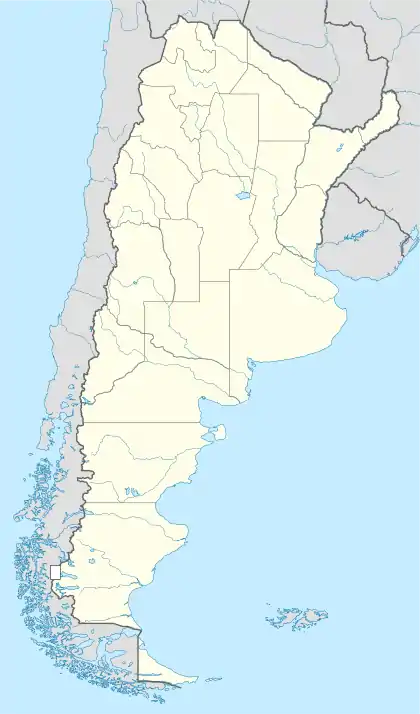2011 Copa América
The 2011 Campeonato Sudamericano Copa América, better known as the 2011 Copa América or the Copa América 2011 Argentina, was the 43rd edition of the Copa América, the main international football tournament for national teams in South America. The competition was organized by CONMEBOL, South America's football governing body, and was held in Argentina from 1 to 24 July. The draw for the tournament was held in La Plata on 11 November 2010.
| Copa América Argentina 2011 | |
|---|---|
 | |
| Tournament details | |
| Host country | Argentina |
| Dates | 1–24 July |
| Teams | 12 (from 2 confederations) |
| Venue(s) | 8 (in 8 host cities) |
| Final positions | |
| Champions | |
| Runners-up | |
| Third place | |
| Fourth place | |
| Tournament statistics | |
| Matches played | 26 |
| Goals scored | 54 (2.08 per match) |
| Attendance | 882,621 (33,947 per match) |
| Top scorer(s) | (5 goals) |
| Best player(s) | |
| Best young player | |
| Best goalkeeper | |
| Fair play award | |
Uruguay won the tournament after defeating Paraguay 3–0 in the final, giving them a record 15th Copa América title and their first since 1995. Paraguay, as the tournament runner-up, earned the Copa Bolivia; Paraguay's performance was noteworthy, as they were able to reach the finals without winning a single game in the tournament; their success in the final stages was achieved by the way of penalty shoot-outs. Brazil were the defending champions but were eliminated by Paraguay in the quarter-finals after failing to convert any of the penalties.[1][2] As the tournament champion, Uruguay earned the right to represent CONMEBOL in the 2013 FIFA Confederations Cup, held in Brazil. Peru finished third after defeating Venezuela 4–1 in the third-place match.
Competing nations
Both Japan and Mexico were invited to join the CONMEBOL nations in the tournament.[3] Following a proposal by UEFA regarding national teams competing in tournaments organised by confederations different from their own, it was reported on 23 November 2009 that the two countries might not be able to take part in the 2011 Copa América.[4] However, on 31 March 2010, CONCACAF confirmed that Mexico would be allowed to send their 2012 U-23 Olympic Team, supplemented with five over-age players.[5] In addition to Mexico sending a weaker team than those teams sent in previous participations, eight of the Mexican players originally called to play the Copa America 2011 were suspended because of indiscipline one week before the competition started.
Japan's participation was in doubt after the 2011 Tōhoku earthquake and tsunami,[6] but the Japan Football Association confirmed on 16 March 2011 that they would participate.[7] However, the Japanese FA later withdrew from the tournament on 4 April 2011 citing scheduling conflict with rescheduled J. League matches.[8][9] Following a meeting with the leadership of the Argentine Football Association, the Japanese FA decided to hold off on their final decision until 15 April.[10][11] The Japanese FA later announced on 14 April that they would compete in the competition using mainly European based players.[12] The Japanese FA withdrew their team again on 16 May citing difficulties with European clubs in releasing Japanese players.[13][14] On the next day, CONMEBOL sent a formal invitation letter to the Costa Rican Football Federation inviting Costa Rica as replacement.[15] Costa Rica accepted the invitation later that day.[16][17]
The following twelve teams, shown with pre-tournament FIFA World Rankings, played in the tournament:
Venues
A total of eight cities hosted the tournament. The opening game was played at Estadio Ciudad de La Plata, and the final was played at Estadio Monumental Antonio Vespucio Liberti.[18]
| Buenos Aires | Córdoba | La Plata | Santa Fe |
|---|---|---|---|
| Estadio Monumental | Estadio Mario Alberto Kempes | Estadio Único | Estadio Brigadier General Estanislao López |
| Capacity: 65,921 | Capacity: 57,000 | Capacity: 53,000 | Capacity: 47,000 |
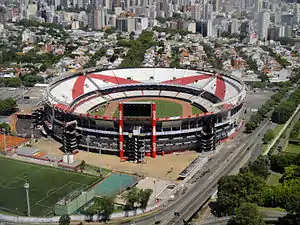 |
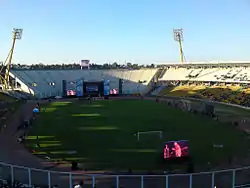 |
 |
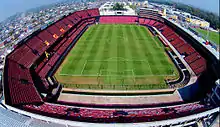 |
| Mendoza | San Juan | ||
| Estadio Malvinas Argentinas | Estadio del Bicentenario | ||
| Capacity: 40,268 | Capacity: 25,000 | ||
.jpg.webp) |
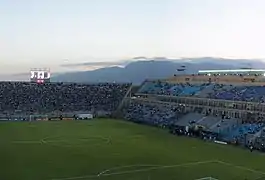 | ||
| Jujuy | Salta | ||
| Estadio 23 de Agosto | Estadio Padre Ernesto | ||
| Capacity: 23,000 | Capacity: 20,408 | ||
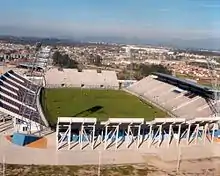 | |||
Draw
The draw for the competition took place on 11 November 2010 at 17:00 (UTC−03:00) in the Teatro Argentino de La Plata in La Plata, and was broadcast in Argentina by Canal Siete.[19][20][21] On 18 October 2010, CONMEBOL's The Executive Committee decided to place the teams in pots for the draw.[22]
| Pot 1 | Pot 2 | Pot 3 | Pot 4 |
|---|---|---|---|
Squads
Each association presented a list of twenty-three players to compete in the tournament five days before their first match. On 14 June 2011, CONMEBOL allowed for the inscription of twenty-three players for the tournament, up one player from the previous allowed twenty-two. Of those twenty-three players, three must be goalkeepers.[23]
Match officials
The list of twenty-four referees and two extra referees selected for the tournament were announced on 6 June 2011 by CONMEBOL's Referee Commission. Two referees were chosen from each participating association:[24][25]
|
|
|
Extra assistants: ![]() Diego Bonfa, Hernán Maidana
Diego Bonfa, Hernán Maidana
- Notes
- Amarilla replaced Antonio Arias, who originally replaced Carlos Torres
Group stage
The first round, or group stage, saw the twelve teams divided into three groups of four teams.[27] Each group was a round-robin of three games, where each team played one match against each of the other teams in the same group. Teams were awarded three points for a win, one point for a draw and none for a defeat. The teams finishing first and second in each group, and the two best-placed third teams, qualified for the quarter-finals.[28]
- Tie-breaking criteria
Teams were ranked on the following criteria:[29]
- 1. Greater number of points in all group matches
- 2. Goal difference in all group matches
- 3. Greater number of goals scored in all group matches
- 4. Head-to-head results
- 5. Penalties (Were to be taken before the final group match by two teams playing each other and tied by points 1–4. Only used as decider, if they then drew the final game.)
- 6. Drawing of lots by the CONMEBOL Organising Committee
| Key to colors in group tables | |
|---|---|
Teams that advanced to the quarter-finals
| |
All times are in local, Argentina Time (UTC−03:00).
Group A
| Team | Pld | W | D | L | GF | GA | GD | Pts |
|---|---|---|---|---|---|---|---|---|
| 3 | 2 | 1 | 0 | 3 | 0 | +3 | 7 | |
| 3 | 1 | 2 | 0 | 4 | 1 | +3 | 5 | |
| 3 | 1 | 0 | 2 | 2 | 4 | −2 | 3 | |
| 3 | 0 | 1 | 2 | 1 | 5 | −4 | 1 |
(H) Host.
| 1 July 2011 | |||
| Argentina | 1–1 | Estadio Ciudad de La Plata, La Plata | |
| 2 July 2011 | |||
| Colombia | 1–0 | Estadio 23 de Agosto, Jujuy | |
| 6 July 2011 | |||
| Argentina | 0–0 | Estadio Brigadier General Estanislao López, Santa Fe | |
| 7 July 2011 | |||
| Bolivia | 0–2 | Estadio 23 de Agosto, Jujuy | |
| 10 July 2011 | |||
| Colombia | 2–0 | Estadio Brigadier General Estanislao López, Santa Fe | |
| 11 July 2011 | |||
| Argentina | 3–0 | Estadio Mario Alberto Kempes, Córdoba |
Group B
| Team | Pld | W | D | L | GF | GA | GD | Pts |
|---|---|---|---|---|---|---|---|---|
| 3 | 1 | 2 | 0 | 6 | 4 | +2 | 5 | |
| 3 | 1 | 2 | 0 | 4 | 3 | +1 | 5 | |
| 3 | 0 | 3 | 0 | 5 | 5 | 0 | 3 | |
| 3 | 0 | 1 | 2 | 2 | 5 | −3 | 1 |
Group C
| Team | Pld | W | D | L | GF | GA | GD | Pts |
|---|---|---|---|---|---|---|---|---|
| 3 | 2 | 1 | 0 | 4 | 2 | +2 | 7 | |
| 3 | 1 | 2 | 0 | 3 | 2 | +1 | 5 | |
| 3 | 1 | 1 | 1 | 2 | 2 | 0 | 4 | |
| 3 | 0 | 0 | 3 | 1 | 4 | −3 | 0 |
Ranking of third-placed teams
At the end of the first stage, a comparison was made between the third-placed teams of each group. The two best third-placed teams advanced to the quarter-finals.
| Grp | Team | Pld | W | D | L | GF | GA | GD | Pts |
|---|---|---|---|---|---|---|---|---|---|
| C | 3 | 1 | 1 | 1 | 2 | 2 | 0 | 4 | |
| B | 3 | 0 | 3 | 0 | 5 | 5 | 0 | 3 | |
| A | 3 | 1 | 0 | 2 | 2 | 4 | −2 | 3 |
Knockout stage
Different from previous tournaments, in the knockout stages, 30 minutes of extra time were played if any match finished tied after regulation (previously the match would go straight to a penalty shootout).[30] This was the first time in the history of the tournament where the knockout stage did not include any invited teams, as both Mexico and Costa Rica were eliminated during the group stage. Paraguay reached the final despite not having won a single match in the competition.
| Quarter-finals | Semi-finals | Final | ||||||||
| 16 July – Córdoba | ||||||||||
| | 0 | |||||||||
| 19 July – La Plata | ||||||||||
| | 2 | |||||||||
| | 0 | |||||||||
| 16 July – Santa Fe | ||||||||||
| | 2 | |||||||||
| | 1 (4) | |||||||||
| 24 July – Buenos Aires | ||||||||||
| | 1 (5) | |||||||||
| | 3 | |||||||||
| 17 July – La Plata | ||||||||||
| | 0 | |||||||||
| | 0 (0) | |||||||||
| 20 July – Mendoza | ||||||||||
| | 0 (2) | |||||||||
| | 0 (5) | |||||||||
| 17 July – San Juan | ||||||||||
| | 0 (3) | Third place play-off | ||||||||
| | 1 | |||||||||
| 23 July – La Plata | ||||||||||
| | 2 | |||||||||
| | 4 | |||||||||
| | 1 | |||||||||
Quarter-finals
| Argentina | 1–1 (a.e.t.) | |
|---|---|---|
| Higuaín |
Report | Pérez |
| Penalties | ||
| Messi Burdisso Tevez Pastore Higuaín |
4–5 | |
| Brazil | 0–0 (a.e.t.) | |
|---|---|---|
| Report | ||
| Penalties | ||
| Elano Thiago Silva André Santos Fred |
0–2 | |
Third place play-off
Goalscorers
With five goals, Paolo Guerrero was the top scorer in the tournament. In total, 54 goals were scored by 39 different players, with only one of them credited as own goal.
- 5 goals
- 4 goals
- 3 goals
- 2 goals
- 1 goal
- Own goal
 André Carrillo (for Chile)
André Carrillo (for Chile)
Statistics
Discipline
Awards
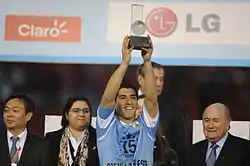
- Most Valuable Player:
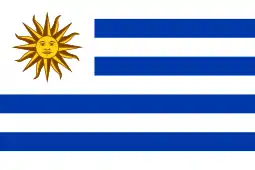 Luis Suárez
Luis Suárez - Top Goalscorer:
 Paolo Guerrero
Paolo Guerrero - Best Young Player:
 Sebastián Coates
Sebastián Coates - Best Goalkeeper:
.svg.png.webp) Justo Villar
Justo Villar - Fair Play Trophy:
 Uruguay
Uruguay
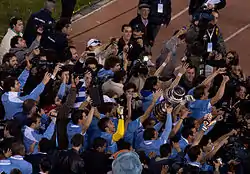
Team of the Tournament
| Goalkeeper | Defenders | Midfielders | Forwards | Manager |
|---|---|---|---|---|
|
|
Sponsorship
Global Platinum Sponsor:
Global Gold Sponsor:
- Kia[35]
- América Móvil (Claro,[36] Telcel,[37] Telmex, Embratel, and Comcel (former) are the brands advertised.)
Global Silver Sponsor:
- Canon[38]
- Anheuser-Busch (Brahma, Budweiser,[39] and Quilmes are the brands advertised.)
- The Coca-Cola Company (Coca-Cola[40] and Powerade are the brands advertised.)
- Petrobras (Lubrax is the brand advertised.)[41]
Official Supplier:
Charitable Partner:
Local Supplier:
Web Hosting:
- UOL Host[44]
Theme song
"Creo en América" by Argentine singer Diego Torres was the official theme song for the tournament.[45] Torres performed the song during the opening ceremonies. A secondary theme song for the tournament is "Ready 2 Go" by Martin Solveig featuring Kele.[46]
References
- Steinberg, Jacob (17 July 2011). "Brazil v Paraguay - as it happened". the Guardian. Retrieved 8 February 2019.
- "Brazil's four missed penalties against Paraguay & five of the most shocking shootouts of all time | Goal.com". www.goal.com. Retrieved 8 February 2019.
- "Mexico and Japan are confirmed in the 43rd edition of the Copa America". CA2011.com. 16 August 2010. Archived from the original on 3 February 2012.
- "México podría quedarse sin Copa América 2011" (in Spanish). Medio Tiempo. 23 November 2009. Archived from the original on 25 November 2009. Retrieved 25 November 2009.
- "Mexico to send Olympic Team". Associated Press. 31 March 2010. Retrieved 1 April 2010.
- "World Football – J.League postponed, Copa in doubt". Eurosport. 14 March 2011. Retrieved 16 March 2011.
- "Japón confirma a Conmebol su participación en la Copa América" [Japan confirms with CONMEBOL their participation in the Copa América] (in Spanish). sport.es. 16 March 2011. Retrieved 4 April 2011.
- "Japón no jugará la Copa América" [Japan will not play in the Copa América] (in Spanish). ESPN Deportes. 4 April 2011. Retrieved 4 April 2011.
- "Japan Set to Skip Copa America After Disaster". Yahoo!7. 3 April 2011. Retrieved 3 April 2011.
- "Copa América: Japón tiene 10 días más" [Copa América: Japan has ten more days] (in Spanish). ESPN Deportes. 5 April 2011. Archived from the original on 1 May 2011. Retrieved 6 April 2011.
- "SAMURAI BLUE(日本代表)のコパ・アメリカ出場について". Japan Football Association. 6 April 2011. Archived from the original on 13 May 2011. Retrieved 6 April 2011.
- "Japan confirm Copa America participation". FIFA. 14 April 2011. Retrieved 14 April 2011.
- "Japan withdraws from Copa America". Japan Football Association. 18 May 2011.
- "Japan withdraw from Copa America". CA2011.com. 17 May 2011.
- "Conmebol officialy [sic] invited Costa Rica to play Copa America". CA2011.com. 17 May 2011. Archived from the original on 25 July 2011.
- "Costa Rica will play the Copa America". CA2011.com. 18 May 2011.
- "Costa Rica Agree to Take Japan's Place at Copa America". New York Times (Reuters). 17 May 2010.
- "Venues for the 2011 Copa America have been decided". CA2011.com. 16 August 2010.
- "Draw of Copa America Argentina 2011 on Thursday, November 11, in La Plata". CA2011.com. 11 November 2010.
- "Copa America draw yields intrigue". FIFA.com. 11 November 2010.
- "Se viene el sorteo de la Copa". Olé (in Spanish). 9 November 2010. Retrieved 10 November 2010.
- "Copa America 2011: Argentina, Brazil and Uruguay heads of series". CA2011.com. 21 October 2010.
- "The 2011 Copa America's national teams will be able to take 23 players to the competition". CA2011.com. 14 June 2011.
- "Referees for Copa America appointed". CA2011.com. 7 June 2011.
- "Copa América: fueron nombrados los árbitros para el torneo" [Copa América: the referees for the tournament were named] (in Spanish). CONMEBOL. 6 June 2011. Archived from the original on 30 June 2011. Retrieved 6 June 2011.
- "Referee Carlos Amarilla will replace Carlos Torres in the 2011 Copa America". CA2011.com. 20 June 2011.
- "2011 Copa America groups defined". CA2011.com. 11 November 2010.
- Official regulations (in Spanish)
- "Regulations". CA2011.com.
- "Announced the official regulations of 2011 Copa América". CA2011.com. 11 November 2010.
- "The Copa América 2011 Dream Team". Copa America Organisation. 8 June 2015. Archived from the original on 30 September 2015. Retrieved 13 September 2015.
- LG. Ca2011.com (22 July 2001.2002)Retrieved on 25 May 2014.
- MasterCard. Ca2011.com (22 July 2002). Retrieved on 25 May 2014.
- Santander. Ca2011.com (22 July 2002). Retrieved on 25 May 2014.
- Kia. Ca2011.com (22 July 2002). Retrieved on 25 May 2014.
- Claro. Ca2011.com (22 July 2002). Retrieved on 25 May 2014.
- Telcel. Ca2011.com (22 July 2002). Retrieved on 25 May 2014.
- Canon. Ca2011.com (22 July 2002). Retrieved on 25 May 2014.
- Budweiser. Ca2011.com (22 July 2002). Retrieved on 25 May 2014.
- Coca-Cola. Ca2011.com (22 July 2002). Retrieved on 25 May 2014.
- Petrobras. Ca2011.com (22 July 2002). Retrieved on 25 May 2014.
- Seara. Ca2011.com (22 July 2002). Retrieved on 25 May 2014.
- UNICEF. Ca2011.com (22 July 2002). Retrieved on 25 May 2014.
- UOL Host. Ca2011.com (22 July 2002). Retrieved on 25 May 2014.
- Diego Torres presents official Copa América song at Obelisk. Buenos Aires Herald. 27 May 2011
- Home | Get In! Archived 26 February 2014 at the Wayback Machine. Getinpr.com. Retrieved on 25 May 2014.
External links
| Wikimedia Commons has media related to Copa América 2011. |

